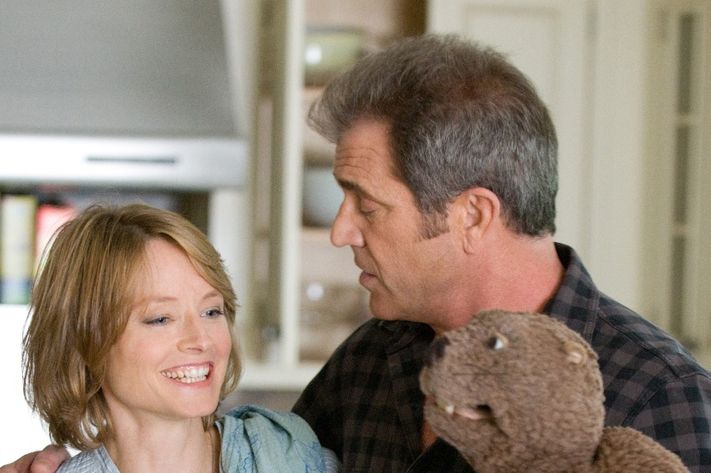

The most-anticipated film of the SXSW festival should have opened in theaters last year. But then Mel Gibson’s misdemeanor battery charges delayed the release of The Beaver, Jodie Foster’s strange and compelling film about a depressive man who attempts to reboot his life by speaking through a beaver puppet. “This is not a comedy,” said Foster before the world-premiere screening on Wednesday night. She went on to say that the film “has a particular tone that takes some getting used to,” and that getting that tone right was “the biggest struggle of my professional career.”
There were no protesters from any of the many groups Gibson has offended, and after the film screened, the audience reacted with a warm round of applause. During the Q&A that followed, Foster raved about Gibson, saying that for those who work with him, Mel is “the most beloved actor in the film business. Chow Yun Fat is probably the second most beloved.” There were no grumblings or boos from the crowd.
And what about the film — was it good enough to save Gibson’s career? We always knew he could act. Let’s call this a first step.
Gibson plays Walter Black, “a hopelessly depressed individual” whom we first see floating in a pool, Tony Soprano–style. A narrator (which we later find is the puppet) explains that he was once a successful toy company boss, father, and husband, but “that man has gone missing.” Jodie Foster plays Walter’s aggrieved wife Meredith, and she demands a separation in the film’s opening scenes, remaining with their two sons — one of whom, the eldest (played by lanky, whip-smart Anton Yelchin), is pursuing a cheerleader valedictorian (Jennifer Lawrence).
The now-homeless Gibson finds a scruffy puppet in a Dumpster. After a botched, drunken suicide attempt in a hotel room, the puppet starts talking. He tells Walter he needs to “blow up the whole goddamn building” of his personality. “I’m the beaver and I’m here to save your goddamn life,” he says. The beaver quickly takes over, and Walter — who begins carrying a card that says, “This person is under the care of a prescription puppet” — appears to recover in record time. Before long, he and the puppet are having sex in the shower with Meredith. Then Walter’s launching a successful line of beaver toys and spreading its quick-fix psychological gospel on the the Today show. (Yes, the same place where Scientologist apologist Tom Cruise blasted psychiatry as a “pseudo-science.”) As the beaver’s power grows, Walter loses his own. He’s addicted. (Beaver as metaphorical stand-in for drugs, liquor, and self-help gurus noted.)
I should explain how the beaver speaks. There’s no ventriloquism: The beaver’s thick brogue comes through Gibson’s lips. This means that for much of the film, Gibson is his own co-star, and when he speaks as the skuzzy brown puppet, with style and panache and vision, you find yourself watching the beaver’s mouth instead of Gibson’s. When you do focus on the actor, what you see is a ravaged face and hollowed-out eyes. That’s when you remember you’re watching Mel Gibson, because it’s virtually impossible not to see the toll that his fucked-up off-screen choices have taken; the man doesn’t have wrinkles so much as sharp geometric troughs etched into his face.
The bravado of Gibson’s performance is undeniable. The beaver (Gibson’s hand and mouth) is hyperactive and relentlessly riffing, even when Walter’s eyes and body look slack and dead. He’s less a guy with a puppet than a conjoined twin. Gibson perfected mania and relentless, antsy charm in everything from Hamlet to Lethal Weapon, but it has never been deployed in such an unsettling way. But the question of tone that so vexed Foster lingers over the film. A fight scene between Walter and his puppet can’t help but play like farce. The pacing of the film, too, is oddly accelerated: Perhaps the quick cuts are meant to indicate the splintered nature of Walter’s psyche, but the result is a film that, despite Foster’s assertions to the contrary, speeds along like a modern comedy when a more patient rhythm might have upped the drama.
It’s tough to know if audiences will want to take this trip with Gibson. He is onscreen for nearly the whole film, usually talking to his hand. Not only do you have to buy him yourself, you have to assume everyone in the film is buying him too — that he is magnetic enough to convince people that he is inspired and not simply crazy. It worked for me. Gibson’s performance was strong enough that I mostly forgot about his real-life transgressions. When I did, it was in the context of Gibson’s alcoholism — the manic way alcoholics get loaded and act out, then shamefully huddle in bed the next day. This is what I thought of when Walter first discovers the beaver in a Dumpster. He’s only there because he’s clearing out the back of his car’s trunk to make room for a heavy case of liquor.

